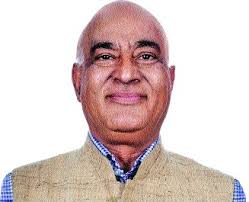Synchronised elections, voter behaviour, and governance outcomes
An active policy proposal of the Government of India is to hold national elections at the same time as the assembly elections of all the states. This article examines whether holding national and stat...
-
 Vimal Balasubramaniam
Vimal Balasubramaniam  Sabyasachi Das
Sabyasachi Das  Apurav Yash Bhatiya
Apurav Yash Bhatiya  28 August, 2020
28 August, 2020
- Articles
Political determinants of newspaper markets in India
Newspapers are an important source of political information for Indian voters. This article looks at how political factors influence the newspaper market. Using the announcement of delimitation in the...
-
 Julia Cagé
Julia Cagé  Guilhem Cassan
Guilhem Cassan  Francesca R. Jensenius
Francesca R. Jensenius  23 November, 2023
23 November, 2023
- Articles
A proposal for public funding of elections and political parties in India
The Finance Minister of India recently introduced measures aimed at cleaning up political party funding in the country. In this article, Gowda and Santhosh highlight the limitations of these measures,...
-
 M.V. Rajeev Gowda
M.V. Rajeev Gowda  Varun Santhosh
Varun Santhosh  21 April, 2017
21 April, 2017
- Perspectives
Outlays to Outcomes: Understanding pathways to improving learning outcome
This project responds to a specific Government of Bihar request to assess the effectiveness of its "Mission Gunvatta" programme, which aimed at improving the learning outcomes of children attending el...
-
 Yamini Aiyar
Yamini Aiyar  Ambrish Dongre
Ambrish Dongre  17 September, 2015
17 September, 2015
- IGC Research on India
What do we know about corruption in India?
Despite ample media coverage of corruption, there remains a gap between headline-making scandals, policy options under discussion, and the actual evidence base drawn from empirical research on corrup...
-
 Sandip Sukhtankar
Sandip Sukhtankar  Milan Vaishnav
Milan Vaishnav  16 September, 2015
16 September, 2015
- Articles
The need for police reform
The police in India are still mainly governed by the Police Act of 1861. In this article, Abhijit Banerjee, Professor of Economics at MIT, emphasises the need for police reform in order to check misu...
-
 Abhijit Banerjee
Abhijit Banerjee  09 September, 2015
09 September, 2015
- Perspectives
Is the MNREGA fund crunch making the programme clientelistic?
Fund allocation for MNREGA has seen a steady decline in real terms over the last few years. Analysing official MNREGA data along with survey data from Rajasthan, this column shows that in the face of...
-
 Upasak Das
Upasak Das  Diego Maiorano
Diego Maiorano  02 September, 2015
02 September, 2015
- Articles
The political economy of data
Recent experiences, especially from Scandinavian countries, show that opening administrative data sources can substantially improve public policymaking. In this article, Pande and Blum contend that w...
-
 Florian Blum
Florian Blum  Rohini Pande
Rohini Pande  21 August, 2015
21 August, 2015
- Perspectives
The significance of local power structures in Bihar's coupon-based PDS
In 2007, Bihar introduced the coupon system in PDS to curb leakages at fair price shops. This column argues that even though the administrative logic of the coupon system is fundamentally sound, such...
-
 Chetan Choithani
Chetan Choithani  Bill Pritchard
Bill Pritchard  17 August, 2015
17 August, 2015
- Articles
Charting a course for the Indian economy
Karthik Muralidharan (Associate Professor of Economics, University of California, San Diego) speaks with Arvind Subramanian (Chief Economic Adviser, Government of India) on a broad set of issues rang...
-
 Karthik Muralidharan
Karthik Muralidharan  Arvind Subramanian
Arvind Subramanian  05 August, 2015
05 August, 2015
- Videos
He is a criminal but he is our criminal: Criminally accused politicians in India
The recent increase in the number of criminally-accused politicians elected to state assemblies has caused much furore in India. Despite the potentially important consequences and the widely divergent...
-
 Nishith Prakash
Nishith Prakash  Marc Rockmore
Marc Rockmore  Yogesh Uppal
Yogesh Uppal  01 August, 2015
01 August, 2015
- IGC Research on India
Elucidating avenues for corruption: Micronutrient fortification strategies in India’s Midday Meals Programme
Globally, iron deficiency is a leading cause of anaemia, a condition that is particularly harmful during early childhood, causing fatigue and slower physical and cognitive development with potentially...
-
 James Berry
James Berry  Saurabh Mehta
Saurabh Mehta  Priya Mukherjee
Priya Mukherjee  Gauri Kartini Shastry
Gauri Kartini Shastry  30 July, 2015
30 July, 2015
- IGC Research on India
Why numbers matter
The delayed and partial release of data from the ‘Rapid Survey on Children’ by the Indian government has given rise to questions and speculation. In this article, former bureaucrat V. Ramani disc...
-
 V. Ramani
V. Ramani  23 July, 2015
23 July, 2015
- Perspectives
PDS computerisation: What other states can learn from Kerala
Given the leakage in the Public Distribution System, Indian states are being encouraged to computerise their PDS. This column analyses Kerala’s experience with PDS computerisation and highlights me...
-
 Silvia Masiero
Silvia Masiero  06 July, 2015
06 July, 2015
- Articles
Do ruling coalition-affiliated MLAs bring more development to their constituencies?
Despite the dismantling of the License Raj in the 1990s, interaction with government officials remains an important impediment to doing business in India. This column analyses the role of politics in...
-
 Samuel Asher
Samuel Asher  Paul Novosad
Paul Novosad  22 June, 2015
22 June, 2015
- Articles
Twitter feed
Tweets by Ideas4IndiaMost Popular Governance Posts
Unique Health Identification and Aadhaar: A case for mandatory linkage
As part of the Digital India initiative, All India Institute of Medical Sciences (AIIMS) issues a Unique Health Identification (UHID) number to each patient, which documents their entire journey in th...
 Mudit Kapoor
Mudit Kapoor  23 December, 2016
23 December, 2016
- Perspectives
Caste dominance in rural India: Cause and effect
Rural India remains a caste-based society. This column explores why caste continues to play such an important role and what the effects are. It argues that trade and agricultural productivity suffer, ...
 Siwan Anderson
Siwan Anderson  16 August, 2012
16 August, 2012
- Articles
Why did the Indian economy stagnate under the colonial rule?
How did the Indian economy fare under the colonial rule? Is the average Indian significantly better off after Independence? This column examines trends in GDP per capita in order to determine the stan...
 Aniruddha Bagchi
Aniruddha Bagchi  16 September, 2013
16 September, 2013
- Articles





 16 November, 2023
16 November, 2023






